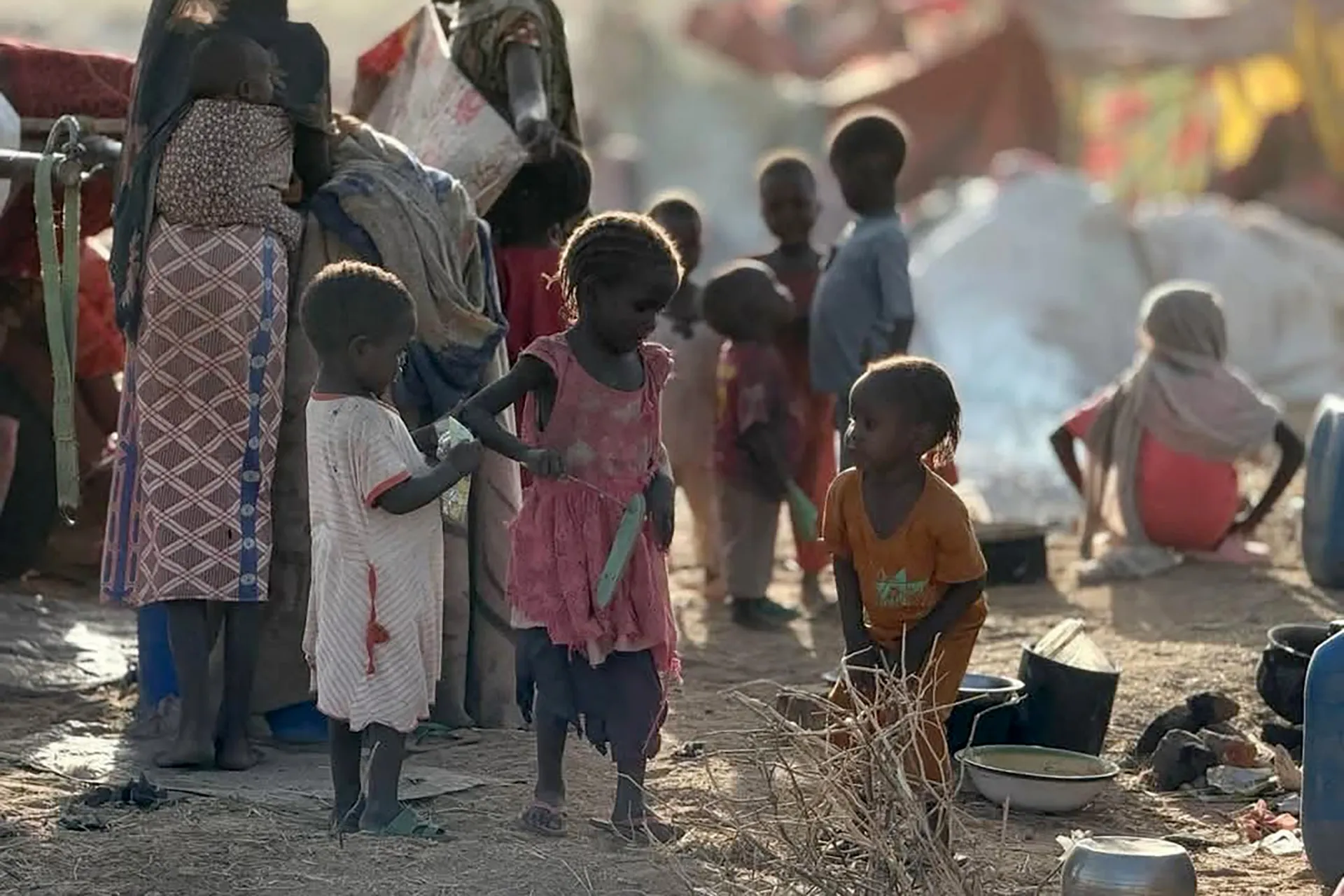Residents of North Darfur State—particularly in El Fasher and the Tawila area—as well as displaced people in camps across the region, are living under dire humanitarian conditions. There is a severe lack of adequate food, drinking water, and healthcare amid outbreaks of deadly diseases such as cholera, while children suffer from malnutrition, resulting in thousands of infections and hundreds of deaths.
The specter of famine looms over many areas, especially after the shutdown of El Fasher’s charitable food kitchen (“Takiyya”), the depletion of food supplies, and skyrocketing prices for what remains available in markets. Medicines, intravenous solutions, and medical staff are also in critically short supply.
Tawila hosts more than one million displaced people, while around 800,000 others are spread across the Kalma, Otash, and Al-Salam camps. Displaced populations suffer from severe shortages of food, medicine, and safe drinking water.
Severe Malnutrition
Haroun Al-Bashir, a humanitarian volunteer in Otash Camp, told Mashawir that “in one camp alone, there are about 500 cases of malnutrition, with more than 200 cases of severe acute malnutrition, most of them among vulnerable groups such as children, breastfeeding mothers, and pregnant women.”
He added, “Thirteen children have died in the Lagawa Camp for displaced people in East Darfur due to malnutrition and their families’ inability to take them to hospitals for treatment.”
Al-Bashir noted that “the few remaining medical centers struggle to respond to the growing number of cholera cases, receiving around 100 cases daily amid shortages of medical staff, hospital beds, intravenous solutions, and other essential supplies.”
Collapse Stage
Meanwhile, the General Coordination for Displaced Persons and Refugees warned that the humanitarian situation in Darfur has reached a state of total collapse, with more lives being lost every day.
The coordination’s spokesperson, Adam Rijal, revealed that in Tawila alone, the daily spread of cholera ranges between 100 and 200 new cases, with a cumulative total of 2,145 cases, 40 deaths, and 207 patients currently in isolation centers. In Golo, Jebel Marra, 23 infections and seven deaths have been recorded.
Rijal said that “displaced people are living in conditions beyond description, lacking the most basic necessities of life—shelter, water, food, medical care, clothing, mosquito nets, cooking utensils, soap, sanitation supplies, and psychological support.” He held both warring parties responsible for the humanitarian catastrophe, shelling, and violations faced by displaced communities in North Darfur.
A statement from the coordination urged the warring parties to immediately cease fire and open humanitarian corridors, appealing to the international community for urgent airdrops of aid before famine turns into a silent genocide.
Disease Outbreaks
Similarly, Dr. Abdelwahab Hassan, a volunteer physician in Tawila’s displacement camps, told Mashawir that “cholera and malnutrition are rampant in the camps, weakening immunity. The suspension and departure of humanitarian organizations have worsened the situation, with no aid available. Hunger is killing children and the elderly at alarming rates, and cholera patients are dying in increasing numbers due to the complete absence of healthcare and a lack of medicines and IV fluids.”
He added that “water contamination and the absence of sanitation have caused cholera to spread in most camps. The lack of medicine has resulted in hundreds of deaths in a short period, raising fears among camp residents.”
The doctor called on both sides of the conflict “to recognize that dozens of children, pregnant women, and elderly people are facing the risk of death from hunger and disease unless urgent action is taken to address this unethical situation and save the displaced in Darfur’s camps.”
UN Warnings
Meanwhile, the UN Office for the Coordination of Humanitarian Affairs (OCHA) in Sudan warned of the rapidly deteriorating health situation in North Darfur as cases of cholera, measles, and malaria rise in Tawila, El Fasher, and Kabkabiya.
OCHA reported that its humanitarian partners on the ground are struggling to meet the growing needs in Tawila and warned that challenges will increase with the onset of the rainy season.
The office noted that local and international partners have set up cholera treatment centers, but current capacity is far from sufficient to handle the growing number of cases. Immediate additional resources are needed, including more treatment centers, mobile health units, ambulances, and waste management equipment.
Hunger and Child Deprivation
In the same vein, new data published by UNICEF showed a sharp rise in the number of children suffering from acute malnutrition across all five Darfur states.
The number has increased by 46% in the first five months of this year alone.
The agency reported that more than 40,000 children have received treatment in North Darfur alone—double the number recorded during the same period last year. It also confirmed that acute malnutrition rates have exceeded the World Health Organization’s emergency thresholds in most areas.
Sheldon Yett, UNICEF Representative in Sudan, warned that children in Darfur “are going hungry due to the conflict and are being denied lifesaving assistance.”
“Even before the peak of the dry season, these numbers are dangerously high and are likely to worsen without swift humanitarian action,” he said, adding that children’s lives depend on “whether the world chooses to act or ignore the crisis.”
Victims of Sexual Violence
Meanwhile, the Darfur Women’s Platform called on the international community and humanitarian organizations to urgently assist residents of El Fasher, as well as the camps and villages that have been attacked, by providing life essentials—water, food, medicine, and supplies for women and children—through UN airlifts to ensure civilian survival.
The platform’s statement also stressed the need for immediate shelter for survivors of sexual violence, including women, girls, young children, and mothers, along with medical assistance and psychological support for them, people with special needs, and children displaced by the war. It further called for the documentation and monitoring of all violations committed, with the aim of prosecuting perpetrators in accordance with international humanitarian law.
